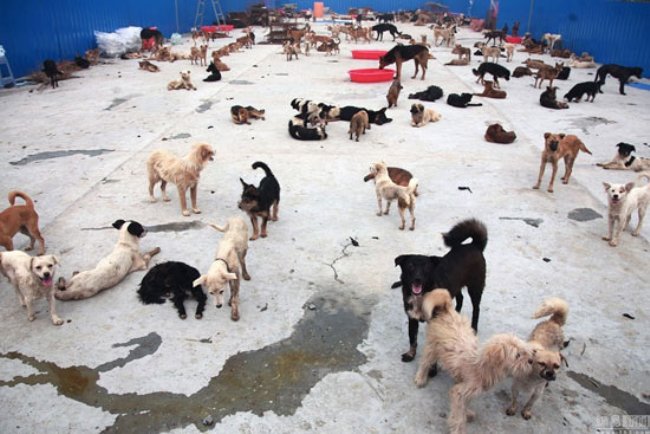This year’s Yulin Dog Meat Festival drew attention from around the world as animal lovers objected to the decades-long tradition of eating dog meat and lychee on the summer solstice in the southern Chinese city. The international community exploded with Twitter campaigns and online petitions in order to stop the festival as Chinese animal rights activists descended on Yulin to try to rescue some of the 10,000 dogs thought to have been prepared for the festival.
However, that was back in June. Attention has now waned to the point where the shelter that currently houses the rescued dogs is struggling to stay afloat as volunteers and contributions continue to dry up. Of the 1,381 dogs that were rescued from the Yulin Dog Meat Festival, only 440 have survived, most dying fro illness.
On July 4, the rescued dogs were transported by truck from the southern province of Guangxi to a remote shelter in Yangzhou, Jiangsu Province, a harrowing journey of 1,800 kilometers that took 35 hours to complete.
But the ordeal was too much for some of the dogs. According to Chang Le, a volunteer at the Hushengyuan shelter that houses the rescued dogs, approximately 200 of them died the first day after arriving.
The rescue did not come cheap. The 1,381 dogs purchased ended up costing around RMB 500,000 ($78,500). But even after the world-wide attention this past summer, donations and volunteers at the Hushengyuan shelter have steadily diminished since then, resulting in less care for the dogs.
“In the first few days after those dogs arrived, we received many donations ranging from medicine to dog food every day, and also many pet lovers across the country came to help us. But now we haven’t seen any pet lovers for some time, and the donations now only come every few days,” Chang said.
Worse, a WeChat campaign to find the rescued dogs new homes has failed to attract attention, resulting in most of the dogs having to remain at the shelter. And while volunteers at the shelter numbered in the dozens when the rescued dogs first arrived, there now are only five left.
Right now, 40 sick dogs are being sequestered in individual kennels while another 400 dogs have been placed into six enclosures. As Chang says, “As there is no vet, many sick dogs died eventually.”
The shelter has an annual rent of over RMB 100,000, and also lacks around RMB 200,000 required to expand. Although China has a growing population of pet owners who are sympathetic to the cause of animal rights, the Yulin rescue operation still faced a lot of opposition online, the biggest criticism being that they won’t be able to take care of the dogs they rescue.
The dog rescuers also have a legal problem in that they transported the dogs over provincial territories without a certificate of quarantine for the dogs, the same violation that animal rights activists were able to pin on dog traffickers transporting dogs to slaughter.
Zhang Zhengzhong, director of the Gaoyou municipal veterinary office, told Modern Express that the dogs should have been returned to Yulin as they lack the legally required documents that prove they have been quarantined.
Zhang said that animal rights activists and animal shelters should seek help from the government, which could send vets from government-backed institutions to treat rescued animals and provide subsidies to support the long-term operation of shelters.
This year’s rescue was much larger in scope than last year’s effort that saved 417 dogs, of which only four died after making the trip to Gaoyou by train. The purchase of last year’s rescued dogs was under RMB 200,000, and they had the proper certification papers for quarantine.
Dogs rescued from the slaughterhouse have faced bleak times before in China. This past March, government workers tasked with removing 89 dogs from an illegal slaughterhouse in Shenzhen inadvertently killed dozens of them because the workers were “too violent” in handling them.


